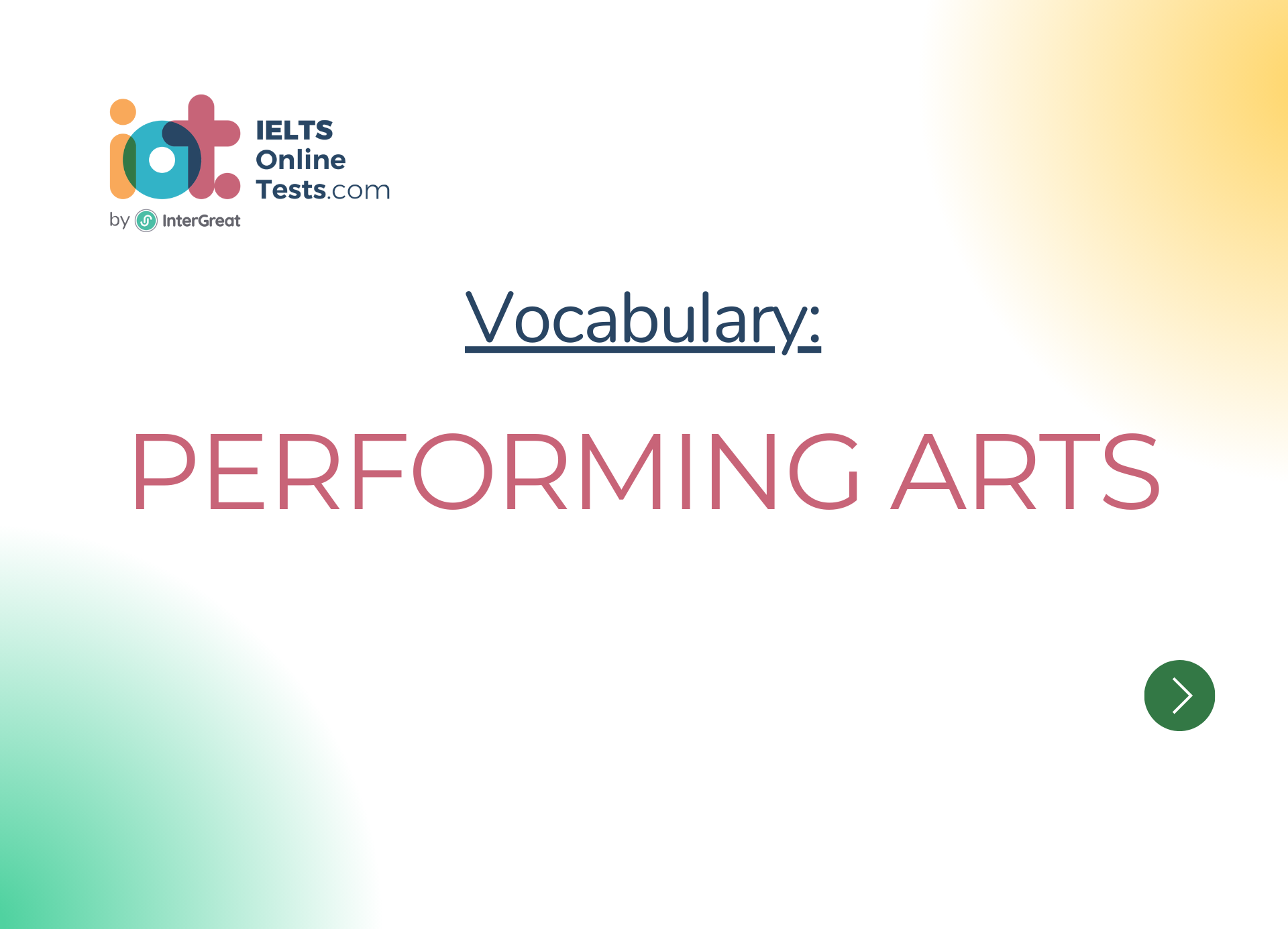
Performing arts
Below is a detailed list of vocabulary related to "Performing arts" suitable for IELTS band 6.5-8.0:
Acting Techniques:
- Definition: Specific methods and approaches used by actors to portray characters convincingly on stage or screen.
Stage Presence:
- Definition: The ability of a performer to command attention and engage the audience while on stage.
Characterization:
- Definition: The process of developing and portraying a character, including their personality, emotions, and behavior.
Improvisation:
- Definition: The act of creating or performing spontaneously without prior preparation or scripting.
Dramatic Monologue:
- Definition: A performance in which a single character speaks at length, revealing their thoughts and feelings.
Theatrical Production:
- Definition: The complete process of staging a play or performance, including direction, set design, and rehearsals.
Choreography:
- Definition: The creation and arrangement of dance movements in a performance.
Stagecraft:
- Definition: The art and skill of creating and managing the technical aspects of a performance, such as lighting and sound.
Blocking:
- Definition: The planned movement and positioning of actors on stage during a performance.
Artistic Expression:
- Definition: The use of creative elements, such as music, dance, and acting, to convey emotions and ideas.
Physical Theatre:
- Definition: A form of performance that relies heavily on physical movement and gestures to communicate.
Ensemble:
- Definition: A group of performers working together as a unified whole in a production.
Theatrical Adaptation:
- Definition: The process of transforming a literary work or real-life events into a stage performance.
Stage Direction:
- Definition: Instructions provided by the director to the actors and crew about how a scene should be performed.
Curtain Call:
- Definition: The moment at the end of a performance when the actors take a bow to acknowledge the applause from the audience.
Artistic Interpretation:
- Definition: The unique and individual way in which a performer or director approaches and presents a work of art.
Musical Score:
- Definition: The written music used in a theatrical production, including songs and background music.
Character Development:
- Definition: The process of building and evolving a character throughout a performance or production.
Live Performance:
- Definition: A performance that is presented in real-time to an audience, as opposed to recorded or filmed performances.
Theatrical Elements:
- Definition: The various components that come together to create a performance, including sets, costumes, and lighting.
Artistic Collaboration:
- Definition: The teamwork and cooperation among performers, directors, designers, and crew members in a production.
Emotional Expression:
- Definition: The conveyance of emotions and feelings by performers to evoke a response from the audience.
Stage Manager:
- Definition: The person responsible for coordinating and overseeing all aspects of a production during rehearsals and performances.
Theatre Critique:
- Definition: An analysis and evaluation of a theatrical performance by a reviewer or critic.
Aesthetic Appreciation:
- Definition: The ability to recognize and value the artistic qualities and beauty of a performance.
Performance Art:
- Definition: A genre of art that combines elements of visual art, music, and performance in live presentations.
Theatrical Repertoire:
- Definition: The collection of plays and performances that a theater company regularly performs.
Theatrical Techniques:
- Definition: Various methods and skills used by performers and directors to enhance the quality of a performance.
Audience Engagement:
- Definition: The interaction and connection between performers and the audience during a performance.
Theatrical Tradition:
- Definition: Long-standing practices and customs in theater that have been passed down through generations.
Performing Arts Education:
- Definition: Formal instruction and training in acting, dance, music, or other performing arts disciplines.
Theatre Etiquette:
- Definition: The accepted behavior and manners expected of audience members attending a live performance.
Artistic Innovation:
- Definition: The introduction of new and original ideas and techniques in a performance.
Performance Venue:
- Definition: The location or space where a theatrical production or performance takes place.
Character Analysis:
- Definition: The examination and understanding of a character's motivations and actions in a performance.
Performance Artistry:
- Definition: The skill and artistry displayed by performers in their craft.
Theatrical Immersion:
- Definition: A performance experience in which the audience is fully immersed in the world of the play.
Artistic Expression:
- Definition: The use of creative elements, such as music, dance, and acting, to convey emotions and ideas.
Physical Theatre:
- Definition: A form of performance that relies heavily on physical movement and gestures to communicate.
Ensemble:
- Definition: A group of performers working together as a unified whole in a production.
By incorporating these vocabulary words into your studies and practice, you can enhance your language proficiency and be better prepared for the IELTS exam. Best of luck!




